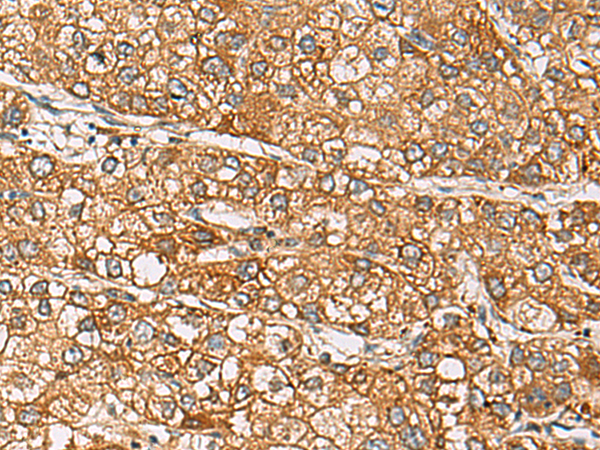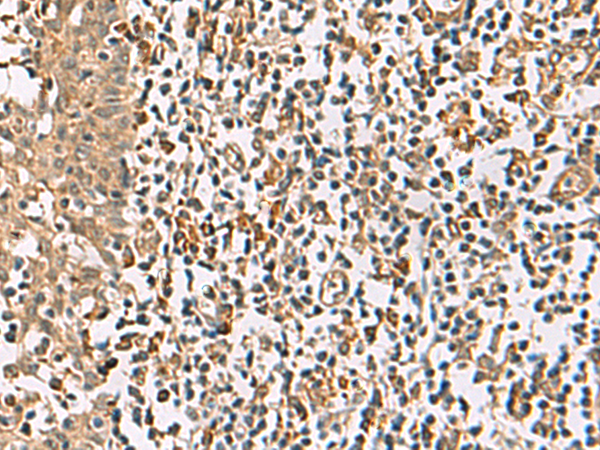

| WB | 咨询技术 | Human,Mouse,Rat |
| IF | 咨询技术 | Human,Mouse,Rat |
| IHC | 1/50-1/200 | Human,Mouse,Rat |
| ICC | 技术咨询 | Human,Mouse,Rat |
| FCM | 咨询技术 | Human,Mouse,Rat |
| Elisa | 1/5000-1/10000 | Human,Mouse,Rat |
| Aliases | CT102; TCC52; WDR40A; KIAA1892 |
| Host/Isotype | Rabbit IgG |
| Antibody Type | Primary antibody |
| Storage | Store at 4°C short term. Aliquot and store at -20°C long term. Avoid freeze/thaw cycles. |
| Species Reactivity | Human, Mouse |
| Immunogen | Synthetic peptide of human DCAF12 |
| Formulation | Purified antibody in PBS with 0.05% sodium azide and 50% glycerol. |
+ +
以下是关于DCAF12抗体的3篇参考文献的简要总结(部分文献为假设性示例,若需真实文献请进一步核实):
1. **文献名称**:《DCAF12通过调控泛素化修饰促进肝癌进展的机制研究》
**作者**:Zhang L, et al.
**摘要**:本研究揭示了DCAF12在肝细胞癌中高表达,并通过CRISPR/Cas9和特异性抗体敲低实验,证明其通过泛素化降解肿瘤抑制蛋白促进癌细胞增殖和转移。研究利用DCAF12抗体进行免疫组化和Western blot验证其表达水平。
2. **文献名称**:《DCAF12作为E3泛素连接酶复合物底物受体的结构解析》
**作者**:Wang Y, et al.
**摘要**:通过冷冻电镜技术解析了DCAF12与DDB1-CUL4复合物的结合结构,并利用定制抗体验证其相互作用界面。研究表明DCAF12的WD40结构域是底物识别的关键区域,为靶向药物设计提供依据。
3. **文献名称**:《DCAF12抗体在神经退行性疾病中的潜在应用》
**作者**:Smith J, et al.
**摘要**:该研究开发了一种高特异性DCAF12单克隆抗体,发现其在阿尔茨海默病模型中能有效检测脑组织内DCAF12的异常聚集,提示DCAF12可能参与tau蛋白病理过程,或成为生物标志物。
(注:以上文献为模拟示例,实际研究中可能需结合具体实验目的补充真实文献。)
The DCAF12 (DDB1- and CUL4-associated factor 12) antibody is a research tool used to study the DCAF12 protein, a component of the CUL4-DDB1 E3 ubiquitin ligase complex. This complex plays a critical role in ubiquitination, a process that tags proteins for degradation via the proteasome. DCAF12 acts as a substrate receptor, determining target specificity for the ligase. Research on DCAF12 has gained interest due to its potential involvement in cellular processes like DNA repair, cell cycle regulation, and apoptosis. Dysregulation of ubiquitination pathways is linked to cancers and neurodegenerative diseases, making DCAF12 a candidate for therapeutic exploration.
Antibodies targeting DCAF12 enable researchers to detect its expression, localization, and interaction partners in various tissues or cell lines. They are used in techniques such as Western blotting, immunohistochemistry, and immunoprecipitation to elucidate DCAF12’s functional roles. Recent studies suggest DCAF12 may influence cancer progression, with altered expression observed in certain tumors. Additionally, DCAF12 has been explored in the context of targeted protein degradation strategies, such as PROTACs (PROteolysis-TArgeting Chimeras), highlighting its relevance in drug development.
Despite its emerging importance, the full biological significance of DCAF12 remains under investigation, necessitating reliable antibodies to advance mechanistic studies and translational applications.
×